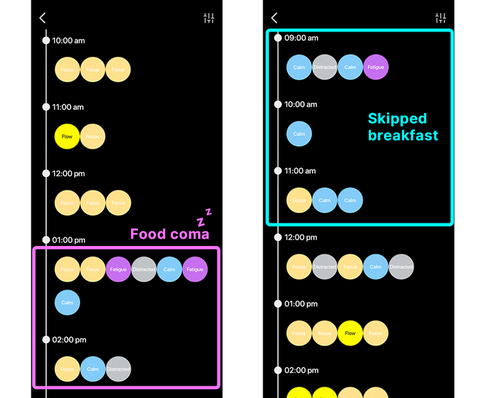
Insights from your FOCI: Part 1
This intro on reading your data focuses on drawing insight from our emotion records.
Our general physiology follows a very clear pattern, we feel more “energetic” at different times of the day. We commonly call this morning / evening person; however, it is more complicated than simply our circadian rhythm. The type of work, activities, such as exercise, eating habits, and caffeine intake all interact to affect our self-control reserve.
Morning person vs non-morning person’s morning productivity comparison.

Evening person’s vs non-evening person’s late nighter productivity comparison.

A meal high in carbohydrates can trigger food coma.
Missing breakfast can deplete self-control reserve and the ability to focus dramatically.

Right amount of caffeine can give you boost while an overdose will get you too edgy.

An intense work session can get you in burnout in just 2 hours.
With biofeedback level 4, you can sustain intense focus for hours with ease.

Learn the pattern from our daily emotion records, so we can exploit it, to adapt our work and schedule to our natural physiology. We can schedule challenging tasks when we reach peak focus or energy level. We can schedule lighter tasks for when we tend to be in a lesser state.
Also, we can learn how different activities impact our self-control, what coincides with fatigue or stress streaks, what triggers distraction streaks.
With this knowledge, we can even start to anticipate an energy dip, and exercise self-control replenishment footwork even before the dip sets in.


